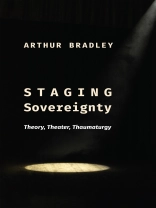To become sovereign, one must be seen as sovereign. In other words, a sovereign must appear—philosophically, politically, and aesthetically—on the stage of power, both to themselves and to others, in order to assume authority. In this sense, sovereignty is a theatrical phenomenon from the very beginning.
This book explores the relationship between theater and sovereignty in modern political theory, philosophy, and performance. Arthur Bradley considers the theatricality of power—its forms, dramas, and iconography—and examines sovereignty’s modes of appearance: thrones, insignia, regalia, ritual, ceremony, spectacle, marvels, fictions, and phantasmagoria. He weaves together political theory and literature, reading figures such as Plato, Aristotle, Montaigne, Leibniz, Kant, Hegel, Schmitt, Benjamin, Derrida, and Agamben alongside writers including Shakespeare, Cervantes, Schiller, Melville, Valéry, Kafka, Ionesco, and Genet.
Formally inventive and deeply interdisciplinary, Staging Sovereignty offers a surprising and original narrative of political modernity from early modern political theology to the age of neoliberal capitalism.
Tabella dei contenuti
Preface: Camera Obscura
Introduction: In the Antitheater of Sovereignty
1. In the Chair: Shakespeare, Kant, Bacon, Ionesco
2. Anointed with Oil: Shakespeare, Milton, Melville
3. Behind the Curtain: Hobbes, Benjamin, Derrida, Deleuze
4. In the Antechamber: Schiller, Kafka, Benjamin, Schmitt
5. Under the Clothes: Montaigne, Kafka, Genet, Agamben
6. Inside the Puppet Theater: Cervantes, Hobbes, Benjamin, Derrida
7. In the Crowd: Jarry, Le Bon, Kelsen, Foucault
Conclusion: In the Empty Space
Notes
Bibliography
Index
Circa l’autore
Arthur Bradley is professor of comparative literature at Lancaster University. His most recent book is
Unbearable Life: A Genealogy of Political Erasure (Columbia, 2019).












